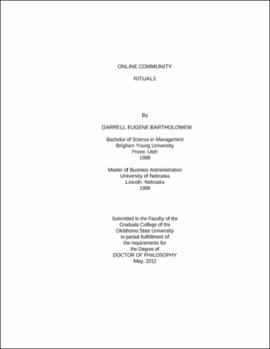| dc.contributor.advisor | Mason, Marlys J. | |
| dc.contributor.author | Bartholonew, Darrell Eugene | |
| dc.date.accessioned | 2013-11-26T08:20:55Z | |
| dc.date.available | 2013-11-26T08:20:55Z | |
| dc.date.issued | 2012-05 | |
| dc.identifier.uri | https://hdl.handle.net/11244/6427 | |
| dc.description.abstract | Scope and Method of Study: The purpose of this research is to investigate online community rituals and the role that ritual experiences play in building and sustaining online communities. Specifically I explore: (1) What are the meaningful rituals occurring in these online communities? and (2) Which ritualized practices are most important in developing ongoing community affiliation for community members? I draw on structural ritualization theory (Knottnerus 1997) to study the ritualization of online interactions and experiences. | |
| dc.description.abstract | Qualitative methods are used to explore the effects of ritual experiences of consumers involved in Facebook. Facebook participants were chosen given the robustness of the community. Similar to past community research, both in-depth interviews and netnographic methods were used (Luedicke 2006; Muniz and Schau 2005). | |
| dc.description.abstract | Findings and Conclusions: These ritual themes help to identify ritual practices that are most important for building a sense of community among members and increasing sustained community interactions at these different stages. SRT is extended in this research by applying this theory of daily rituals to the marketing domain and a new consumer context. The theory's rankings are given further emphasis in the ritual identification model by adding the sources of the behavioral rituals (cosmological, communal, consumption, individual, and relationships) to help classify the types of rituals being ranked and identified by SRT. | |
| dc.description.abstract | Community members were found to have formed strong habits by following these ritual scripts and continuing their engagement in daily ritualized behavior. Ritual themes were identified in both the coding of in-depth interviews and netnographic analysis of Facebook pages (Flick 2006). In addition to the ritualized elements of SRT, three behavioral stages of an online community were identified. These phases together with ritual themes that appear most prevalent in each stage are presented. Specifically, the ritual themes of freedom from constraints, network expansion, collective sharing, social support, utilitarian, entertainment, network control, and reflexive identity were found to be the most important rituals according to rank that are occurring during three distinct stages (young cliques, social debuts, regulative linkers) in the Facebook community. | |
| dc.format | application/pdf | |
| dc.language | en_US | |
| dc.rights | Copyright is held by the author who has granted the Oklahoma State University Library the non-exclusive right to share this material in its institutional repository. Contact Digital Library Services at lib-dls@okstate.edu or 405-744-9161 for the permission policy on the use, reproduction or distribution of this material. | |
| dc.title | Online community rituals | |
| dc.contributor.committeeMember | Brown, Tom J. | |
| dc.contributor.committeeMember | Zablah, Alex R. | |
| dc.contributor.committeeMember | Knottnerus, J. David | |
| osu.filename | Bartholomew_okstate_0664D_12123 | |
| osu.accesstype | Open Access | |
| dc.type.genre | Dissertation | |
| dc.type.material | Text | |
| dc.subject.keywords | regulative linkers | |
| dc.subject.keywords | rituals | |
| dc.subject.keywords | social debuts | |
| dc.subject.keywords | social networks | |
| dc.subject.keywords | structural ritualization theory | |
| dc.subject.keywords | young cliques | |
| thesis.degree.discipline | Marketing | |
| thesis.degree.grantor | Oklahoma State University | |
